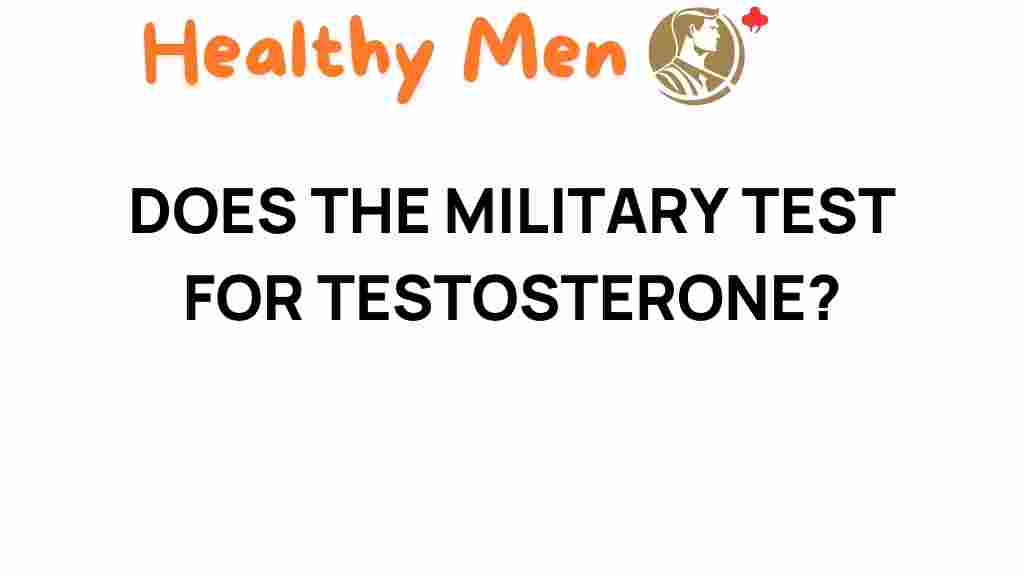Unveiling the Truth: Does the Military Screen for Testosterone Levels?
In the realm of military service, health and fitness are paramount. Aspiring soldiers undergo rigorous assessments to ensure they meet the necessary standards for physical performance. One critical aspect of soldier health that has garnered attention is hormone levels, particularly testosterone. This article delves into whether the military conducts testing for testosterone levels during medical evaluations and the implications of such screenings on soldier health and performance.
Understanding Testosterone and Its Role in Military Fitness
Testosterone is a vital hormone that plays a significant role in various physical and mental functions in the body. In the context of military service, testosterone is linked to:
- Muscle Mass: Higher testosterone levels are associated with increased muscle mass and strength, essential for physical performance in combat and training.
- Energy Levels: Adequate testosterone contributes to overall energy levels, impacting endurance and stamina during demanding exercises.
- Mood and Cognitive Function: Testosterone influences mood and cognitive abilities, which are crucial for making quick decisions in high-pressure situations.
Given these factors, the question arises: does the military actively screen for testosterone levels during health screenings?
Military Testing and Health Screening Protocols
The military is known for its comprehensive health screenings. These evaluations are designed to ensure that each soldier is physically fit and capable of meeting the demands of military service. However, the specifics of what is tested can vary based on the branch of service and the role of the individual.
Typically, military medical evaluations may include:
- Physical examinations
- Vision and hearing tests
- Cardiovascular assessments
- Psychological evaluations
- Blood tests for various health markers
While testosterone levels can be a significant factor in overall health, standard military testing does not routinely include hormone level screening for all recruits. This is primarily due to the focus on immediate physical fitness requirements and the belief that testosterone levels generally fall within a normal range for most individuals.
When Testosterone Testing is Conducted
Though military testing does not typically screen for testosterone levels during standard evaluations, there are scenarios where it may be assessed:
- Medical Concerns: If a soldier presents symptoms suggestive of low testosterone—such as fatigue, muscle weakness, or mood changes—a healthcare provider may recommend testing as part of a broader medical evaluation.
- Specialized Roles: Certain roles within the military that demand heightened physical performance may warrant specific health assessments, including hormone levels.
- Post-Injury Assessments: Soldiers recovering from injuries may undergo comprehensive evaluations to determine their readiness to return to duty, which could include hormone level testing.
The Importance of Hormone Levels in Soldier Health
Maintaining balanced hormone levels is crucial for soldier health and performance. Testosterone, in particular, influences various aspects of health, including:
- Recovery: Optimal testosterone levels can enhance recovery from physical exertion, reducing downtime and improving training efficiency.
- Injury Prevention: Adequate hormone levels may help prevent injuries by promoting muscle strength and joint health.
- Overall Wellbeing: Balanced hormone levels contribute to mental wellbeing, enhancing focus and resilience during stressful situations.
Step-by-Step Process for Hormone Level Evaluation
If a soldier or recruit is concerned about their testosterone levels, the following steps outline the evaluation process:
- Consultation: Begin by consulting a healthcare provider who specializes in military medicine.
- Medical History Review: The provider will review the individual’s medical history and symptoms.
- Physical Examination: A physical examination may be conducted to assess any physical signs of hormone imbalance.
- Blood Tests: If warranted, blood tests will be performed to measure testosterone levels along with other relevant hormones.
- Results Discussion: Once the results are available, the healthcare provider will discuss the findings and any necessary follow-up or treatment options.
Potential Issues with Testosterone Testing
While understanding testosterone levels can be beneficial, there are potential issues that may arise, including:
- Variability of Results: Testosterone levels can fluctuate throughout the day, meaning that a single test may not provide an accurate representation of an individual’s baseline levels.
- Stigma: Some service members may feel stigmatized by hormone testing, fearing it could affect their career prospects.
- Access to Treatment: If low testosterone is diagnosed, accessing treatment within the military healthcare system can be complex and may vary by location.
Conclusion: The Future of Testosterone Screening in the Military
As the military continues to evolve its approach to soldier health and fitness, the importance of hormone levels, including testosterone, is likely to gain more attention. While current military testing protocols do not routinely include testosterone screening, understanding its role in physical performance and overall health is crucial.
For soldiers and recruits, awareness of their hormone levels can empower them to take proactive steps in managing their health. Regular exercise, a balanced diet, and stress management are key factors in maintaining optimal hormone levels and enhancing fitness.
As research progresses, there may be a shift towards more comprehensive health screenings that include hormone level evaluations as part of standard military medical assessments. This could ultimately lead to improved soldier readiness and overall health.
For more information on military health evaluations, you can refer to the Department of Defense health guidelines. If you have specific concerns about testosterone levels, seek advice from a qualified healthcare provider.
In conclusion, while testosterone screening is not a standard part of military testing, understanding its importance can help soldiers maintain their fitness and health throughout their service.
This article is in the category Conditions and created by healthymen Team
